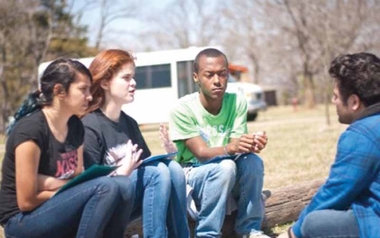More than just a support group

Youth Services of Tulsa's LGBT support group ‘coming out’
by Emma Rose Kraus
Journalism Intern
“Support, education and advocacy.”
Youth Services of Tulsa's (YST) LGBT group is more than just support for youth, and according to Vic Wiener, the GSA Coordinator, the group has those three main focuses. Weiner said as a support group “youth and their allies have a place to come together to talk about what’s going on in their lives and give and receive support from each other.”
As an educational atmosphere, the group is given a topic to discuss at every meeting. “Social justice issues and national social justice issues, to social-emotional skills,” Weiner said. The advocacy part of the program sees youth signing up to be brought to the Capitol to lobby for LGBT rights, as well as “working with youth to help them use their voices to advocate for themselves, their schools and their families.”
Since 1969, YST has been a place for the young people of Tulsa, Oklahoma to find solace, shelter and community. It hosts many programs for youth including Safe Place, PregNot and counseling services, as well as programs for young first offenders, a Saturday evening coffee-house for young people and transition programs for homeless youth aging out of the emergency shelter.
And then there is the LGBT support group, which I, myself, frequented as a pre-teen and teenager growing up in Tulsa, Oklahoma.
The LGBT support group began in 1992, and while it was once not one of their more well-known programs, “In recent years it has come out into the public eye,” said Assistant Director Tania Pryce.
“I think that our agency having that safety net of an emergency shelter, a Safe Place program, helps, but we’re not going to encourage somebody to do something that could potentially put them at risk.”
Even with all of this progress, Pryce admits that when coming out, LGBT youth still face being pushed out of their homes by their families, which makes the emergency shelter program all the more important.
Still, according to Wiener, families seem to be coming around. “My first year I was contacted by three parents the entire year looking for resources to support their children, and I barely go a week now without being contacted by parents.”
Over the past year, the group has had over 30 youth participants, with an average of 15 to 20 coming to the weekly meeting.
Members of the group are from all over Tulsa and surrounding areas, and even from the emergency youth shelter, which is also run by YST, next door. Many of the students in the Youth Services support groups are also members and leaders of their own school Gay-Straight Alliances, social justice groups and diversity clubs, which, with the help of YST, have almost doubled in number in the past three years – from 17 to 30 at the time of press.
As a veteran of the program, I remember when the support group was just that: a place where LGBT youth would go to discuss coming out and what it truly means to be LGBT in Oklahoma. Some of our experiences tied to that. I watched it morph and change into something even more incredible. This year, Youth Services of Tulsa’s float at the Tulsa Pride Parade had 197 people, mostly youths, walking with it. Young people from the program have many doors opened for them that simply weren’t there before. They are educated in more than just matters in the LGBT community, but also feminism, civil rights and many more social justice issues.
Above all, Pryce says, Youth Services is all about the youth. “Really we just want young people to feel cared for. We want to respect them, we want to treat them with dignity, we want them to know that they’re valuable people and that somebody cares about them and wants to see them succeed.”
For more information about Youth Services of Tulsa visit, their website www.yst.org.
Copyright 2016 The Gayly – September 21, 2016 @ 10:25 a.m.





